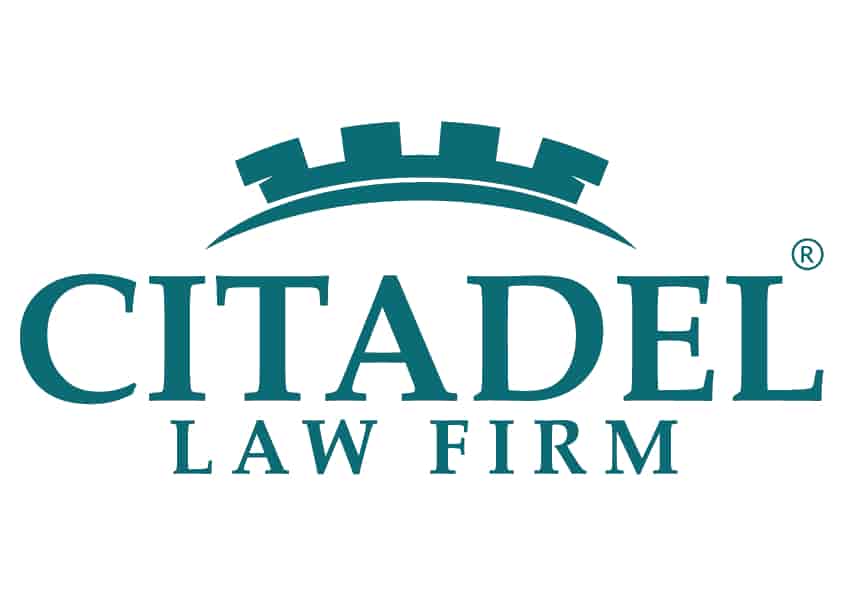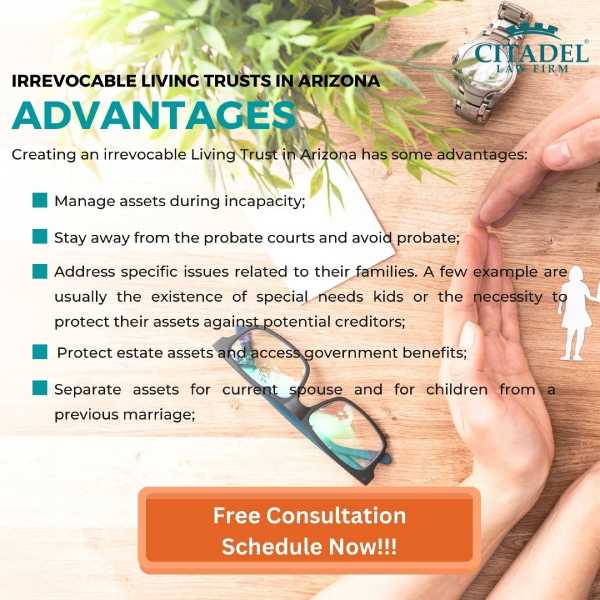An irrevocable Trust is not for everybody in Arizona, but one may be right for you.
An irrevocable living trust is a powerful instrument to protect your assets, specially in Arizona. Read our article to learn more.
Arizona laws for trusts are some of the best in the country. A lot of our potential clients come to our office asking us to create a trust for them.
Before we even make any recommendations we do our best to understand your family members dynamic, the size of your estate and if it will be subject to any federal estate taxes, and what you are trying to accomplish by creating a trust.
Although a trust is a powerful instrument to protect assets and avoid the probate process, it is not an instrument that should be created in all scenarios. Not all families and situations are the same and an irrevocable trust is not for everybody.
Read our blog article to understand what is an irrevocable living trust. This specific blog article is about irrevocable trust but we will do a quick overview of what a trust is, and the difference between revocable trusts and irrevocable trusts. We hope you enjoy it.
If you want to know what a revocable living trust is, click here.
Some background on trusts and what they accomplish
Clients that want our law firm to create trusts for them usually do so for 4 main reasons:
- Manage assets during incapacity;
- Stay away from the probate courts and avoid probate;
- Address specific issues related to their families. A few example are usually the existence of special needs kids or the necessity to protect their assets against potential creditors;
- Protect estate assets and access government benefits;
Another common reason is also blended families and the necessity to separate assets for current spouse (and "new" children) and for children from a previous marriage.
Although a lot of potential clients are concern about estate taxes that is not so relevant to most people. Most estates are not considered a taxable estate in Arizona. If you do have an estate that is worth more than $5 million consulting with a trust lawyer is even more important.
All trusts - either revocable or irrevocable - include three parties: a grantor, a trustee and the beneficiaries of the trust. In a revocable trust is common and possible for one person to act on the basis of all three parties.
While they offer more flexibility, revocable trusts offer limited creditor protection and their main goal is usually to avoid probate. Irrevocable trusts are not as flexible and they are usually created with the goal of asset protection, such as protecting estate assets from creditors or for special needs purposes. Revocable trusts are more common than irrevocable ones.
Tell me the meaning of irrevocable trust? What is an irrevocable trust?
Irrevocable or unchangeable trusts are trusts that remain in existence and can’t be change after they are created (although there are exceptions where the trust may be modified - with court approval - or terminated). One specific type of irrevocable trust is an irrevocable life insurance trust, which can help in estate tax reduction and asset protection.
When creating an irrevocable trust, the grantor transfers property in trust and ceased control over the properties and trust. In addition, irrevocable trusts are not allowed in any state where there is no beneficiary’s consent to change or terminate the Trusts, which is not the case in Arizona.
Revocable living trusts are totally different. The grantor holds ownership in the trust asset and can change this Trust at their discretion any time.
How is an irrevocable trust created?
An irrevocable trust is usually created when someone passes away and there is a provision that makes a revocable trust automatically an irrevocable one after their passing (if they had a revocable trust), or a new trust is created out of their previous trust. Or a combination of irrevocable trust (for a special needs child) and a revocable trust is automatically created.
Some clients have us create an irrevocable trust for them from the beginning with the goal to apply for Medicaid and ALTCS in Arizona. In that case advanced estate planning is required to avoid the 5 year look back period and not prevent someone from applying for government benefits. If you think that is your case please call us today for your own benefit. The assets held in trust may be used to supplement your care.
It is crucial to work with an experienced estate planning attorney to ensure the trust is set up correctly and aligns with your estate planning goals.
Independently how the irrevocable trust was created the final goal is usually the same: protect assets from creditors for future generations.
A revocable trust is not necessarily the right instrument to use if you plan to apply for government benefits. We usually prefer to do a Will based estate plan if we know you will apply for benefits soon instead of a revocable trust. A Last Will and Testament with all the proper deeds and powers of attorney in place is a powerful estate planning tool to use. We may even advise the creation of a testamentary trust depending of your situation. Talk to an estate plan attorney licensed in Arizona that also does Elder Law to help you in this case. Testamentary trusts are not very common is Arizona but they can for sure be used in some specific cases.
Irrevocable living trusts: Revocable or irrevocable trusts
Revocable living Trusts will provide for the grantor until he dies and the assets will be passed on to its beneficiaries as he passes them on to his heirs. A successor trustee will oversee the transfer of the assets. The trust may be modified at any time in accordance with the trust guidelines. What our video (click here) to understand better what a revocable living trust is.
An irrevocable trust may be a mechanism for making decisions about your property that you will not want to change in the future. A few examples are A) Impoverish yourself to be able to apply for government benefits and minimize estate taxes. B) Make a government grant or scholarship available. C) Protect your wealth and assets against creditors. D) Create Charitable trusts after the grantor’s death. A irrevocable trust can’t be changed after it is created. The trust may be terminated if it no longer serves it purpose and it has no reason to exist though.
Irrevocable vs. Revocable trust Irrevocable trusts are generally used to avoid the probate process, saving both time and money. To understand more about the difference between this two types of trusts read our article about it, you can click here to read more about it.
Irrevocable Trust Uses
An irrevocable trust has one or more grantors, a trustee (or trustees), and a beneficiary or beneficiaries. Once the grantor has placed assets in irrevocable trusts, the grantee does nothing but revoke them. During this time a trustee and a beneficiary must approve the trust assets. A grantor can’t be its own trustee. Assets held in trust and property transferred to the trust will not longer be able to be removed from the trust.
Irrevocable trusts are often used when planning for the protection or distribution of an inheritance in a protect way (protection against creditors, divorce, etc). If you have an irrevocable trust you should consult a tax advisor for guidance in the tax planning process as well. At our law firm we also have tax attorneys that will take it into consideration when designing your irrevocable trust. Irrevocable trusts can also offer significant tax advantages, which should be considered in your estate planning strategy.
Tell me the downside of irrevocable trust?
In a nutshell, the downside of irrevocable Trusts is no modifications. As life happens and circumstances changes that may become a problem. Also you cannot be trustee of your own trust, which means giving up control either to a child that your trust or a professional trustee company that will always follow the guidelines of the trust.
What make an irrevocable trust effective sometimes is the main reason people don’t want to create them: they have to give up control over the assets placed in trust. Once establishing your trust and transferring the assets it will no longer be possible to change it at your free will. If you are concern about giving up control a revocable trust may be more appropriate to you.
You can also work with an attorney to create a revocable living trust that will turn into an irrevocable trust automatically after you are no longer alive. That strategy is sometimes implemented for blended families where the children from the first marriage is not in good terms with their new stepmother or stepfather. You can create a trust for your children.
We implement this type of strategy also more frequently when there is a significant age gap between the spouses. The older spouse usually wants to create supplemental security income for their new spouse but they also want to make sure their children from a previous marriage still has access to their share of their inheritance. Sometimes a combination of a trust with some life insurance for the surviving spouse will bring some benefits to your family without the need to change named beneficiaries in a trust that already exists. We can use life insurance as well to fund a trust for the surviving spouse. The trust fund will happen after your die and the life insurance is paid.
We strongly advise you to work with an estate planning attorney who understands federal estate tax implications if your estate is large enough to be considered a taxable estate. Tax rules vary estate by estate and they change all the time. You need to make sure your trust document takes advantage of any tax benefits that may exist in your favor. If you have an estate that is over $5 million assets schedule a consultation with us.
We will go over all your personal finance with you and we will make sure you have a proper strategy in place before your transfer assets to your trust. It is very likely we will recommend a dynasty trust for you and your family. Click here to read more about dynasty trusts. Dynasty trust are usually a combination of a revocable trust that will turn into a new trust, or multiple trust, in the future.
If you want to understand if you should transfer your house to a child while you are still alive in Arizona read our blog- click here.
Our Law Firm is specialized in Trusts in Arizona - revocable and irrevocable trusts
We work on a variety of irrevocable trust as well as revocable trusts types at Citadel Law Firm. We have law firm that specializes in estate planning, trusts and wills, with background in tax and finance. We are also familiar with elder law and we will make sure that your revocable and irrevocable trusts comply to Arizona law to apply for benefits .
Contact us today to schedule your free consultation, click here or on the button below, or call (480) 565-8020. Our estate planning attorneys in Chandler, AZ will be pleased to help you. We can create revocable trusts and irrevocable trusts for you. To learn more about different types of trust in Arizona click here.



